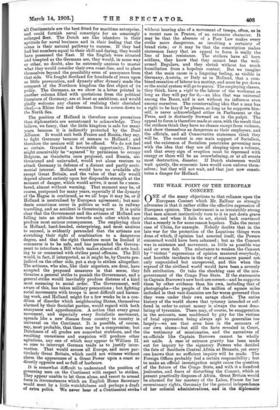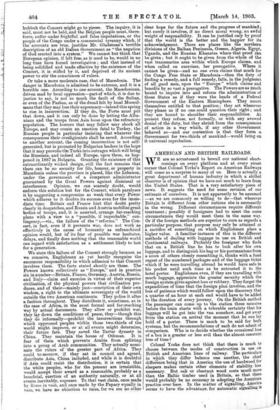THE WEAK POINT OF THE EUROPEAN CONCERT.
ONE of the many objections to that reliance upon the European Concert which Mr. Balfour so strongly advocates is that it rather stifles the effective expression of European opinion. The instrument is so irresistibly strong that men almost instinctively turn to it to put down grave abuses, and when it fails to act, shrink back convinced that a remedy is for some reason hopeless. Take the recent case of China, for example. Nobody doubts that in the late war for the protection of the Legations things were done of which, if opinion had asserted. itself, the Powers concerned would. have been ashamed ; but as the Concert was in existence and. movement, as little as possible was said or even felt. The reluctance to weaken the Concert by " violent " expressions of opinion mastered everybody, and horrible incidents in the way of massacre passed not only unpunished but unreproved, and this when the reproof of the civilised world would have been a severely felt retribution. Or take the shocking case of the mis- government of the Congo Free State. If the statements in Captain Burrows's new book are correct—and. he supports them by other evidence than his own, including that of photographs—the people of the million of square miles included in that vast dominion are far worse governed than they were under their own savage chiefs. The entire history of the world shows that tyranny intended or suf- fered in order to extort money is always the most deso- lating of tyrannies, There may, of course, be exaggeration in the accounts, men maddened by pity for the victims of local oppression being always apt to generalise too largely—we see that even here in the accounts of our own slums—but still the facts revealed in Court, the testimony of missionaries, and. the narratives of ex-officials like Captain Burrows cannot be wholly set aside. A case of extreme gravity has been made out for inquiry by the signatory Powers who decided the fate of Southern Central Africa at Brussels, yet every one knows that no sufficient inquiry will be made. The Foreign Offices probably feel a certain responsibility ; but to make an official investigation might rouse the question of . the future of the Congo State, and. with it a hundred. jealousies, and fears of disturbing the Concert, which at present practically disposes of Africa. Great Britain would be alarmed for her mastery of the Lakes, France for her reversionary rights, Germany for the general independence of her colonial administrations, and. in the diplomatic hubbub the Concert might go to pieces. The inquiry, it is said, must not be held, and the Belgian people must, there- force, suffer under frightful. and false imputations, or the people of the Congo under a commercial tyranny which, if the accounts are true, justifies Mr. Gladstone's. terrible description of an old Italian Government as "the negation of God erected into a system." We cannot but think that European opinion, if left free, as it used to be, would in no long time have forced investigation ; and that instead of being solidified and made effective by the existence of the Concert, it is stifled. by it, and deprived of its ancient power to stir the consciences of rulers.
Or take a more moderate case, that of Macedonia. The danger in Macedonia is admitted to be extreme, and it is a horrible one. According to one account, the Macedonians, driven mad by local oppression—part of which, it is due to justice to say, is not so much the fault of the Sultan, or even of the Pashas, as of the dread felt by local Mussul- mans that they may lose their supremacy—intend this spring to rise in insurrection.' If they do, the Porte must pit that down, and it can only be done by letting the Alba- nians and the troops from Asia loose upon the refractory population. The horrors that may follow may shock all Europe, and may create an emotion fatal to Turkey, the Russian people in particular insisting that whatever the consequences their coreligionists shall be saved. According to another account, the coming insurrection is not self- generated, but is promoted by Bulgarian leaders in the hope that it may provoke the Turks into outrages which will bring the Russians, and indeed all Europe, upon them, as hap- pened in 1887 in Bulgaria. Granting the existence of this extraordinarily wicked design, still the fact remains that there can be no security for life, honour, or property in Macedonia unless the province is placed, like the Lebanon, under the government of a competent administrator guaranteed by the Great Powers against disinissal or interference. Opinion, we can scarcely doubt, woul4 enforce this solution but for the Concert, which paralyses it by suggesting a compromise so weak that every -Power which adheres to it doubts its success even for the imme- diate time. Britain and France hint that doubt pretty clearly in despatches, and Russia and Austria mobilise great bodies of troops, and, it is asserted, arrange far-reaching plans with a view to a "possible, if improbable," con- tingency,—viz., the failure of the "reforms." The Con- cert, in fact, even if it prevents war, does not work as effectively in the cause of humanity as enfranchised opinion would, but in' its fear of possible war hesitates, delays, and finally does nothing that the reasonable world can regard with satisfaction as a settlement likely to last for a generation.
We state this failure of the Concert strongly because, as we conceive, Englishmen as yet hardly recognise the enormous responsibility in Which adhesion to that Concert involves them. The facts stated shortly are these. The Powers known collectively as "Europe," and in practice six in number—Britain, France, Germany, Austria, Russia, and Italy—claim and exercise in virtue of their superior civilisation, of the physical powers that civilisation pro- duces, and of their—mainly just—conviction of their own wisdom, a right to the ultimate sovereignty of the world outside the two American continents. They police it after a fashion throughout. They distribute it, sometimes, as in the case of Africa, in the most formal and far-reaching way by actual documents. They allow or prohibit war, they lay down the conditions of peace, they—though this they do informally—prohibit the insurrections through which oppressed peoples within those two-thirds of the world might improve, or at all events might determine, their future fate. They saved the Tartar dynasty in China. They maintain the house of Othman. It is fear of them which prevents Arabia from splitting into a group of Arab communities. They actually nomi- nate the rulers of the greater part of Africa. They could. to-morrow, if they sat in council and agreed, distribute Asia, China included, and while it is doubtful if Asia could resist the distribution, it is certain that the white peoples, who for the present are irresistible, would accept their award as a reasonable, probably as a beneficial, exertion of an authority naturally, or at all events inevitably, supreme. To that vast claim, once made by Rome in vain, and once made by the Papacy equally in vain, we. have no objection to raise, for we see no other dear hope for the future and the progress of mankind; but surely it involves, if no direct moral wrong, au awful weight of responsibility. It can be justified only by proef that the world is the better and the happier for its acknowledgment. There are places like the northern divisions of the Balkan Peninsula, Greece, Algeria, Egypt, Uganda, and the Russian Khanates where that proof gen be given ; but it ought to be given from the whole of the vast transmarine area within which Europe claims, and when called on exercises, her prerogative. Where it cannot be given—and no one even claims that much fer the Congo Free State or Macedonia—then the duty . of finding a remedy, and a full remedy, falls, in the judgmthat of all, good men, upon the " Europe " which claims and benefits by so vast a prerogative. The Powers are as niuch bound to inquire into and reform the administration of those States as if they were the heads of a Federal Government of the Eastern Hemisphere. They assert themselves entitled to that position ; they act whenever they please as if no one could question their right ; and they are bound to shoulder their, responsibilities. At present they refuse, not formally, or with any avowed denial of the duty, but they shrink from the consequences of action in a way which, if any other Government behaved so—and our contention is that they form .a Government for two-thirds of mankind—would bring on it universal reprobation.











































 Previous page
Previous page